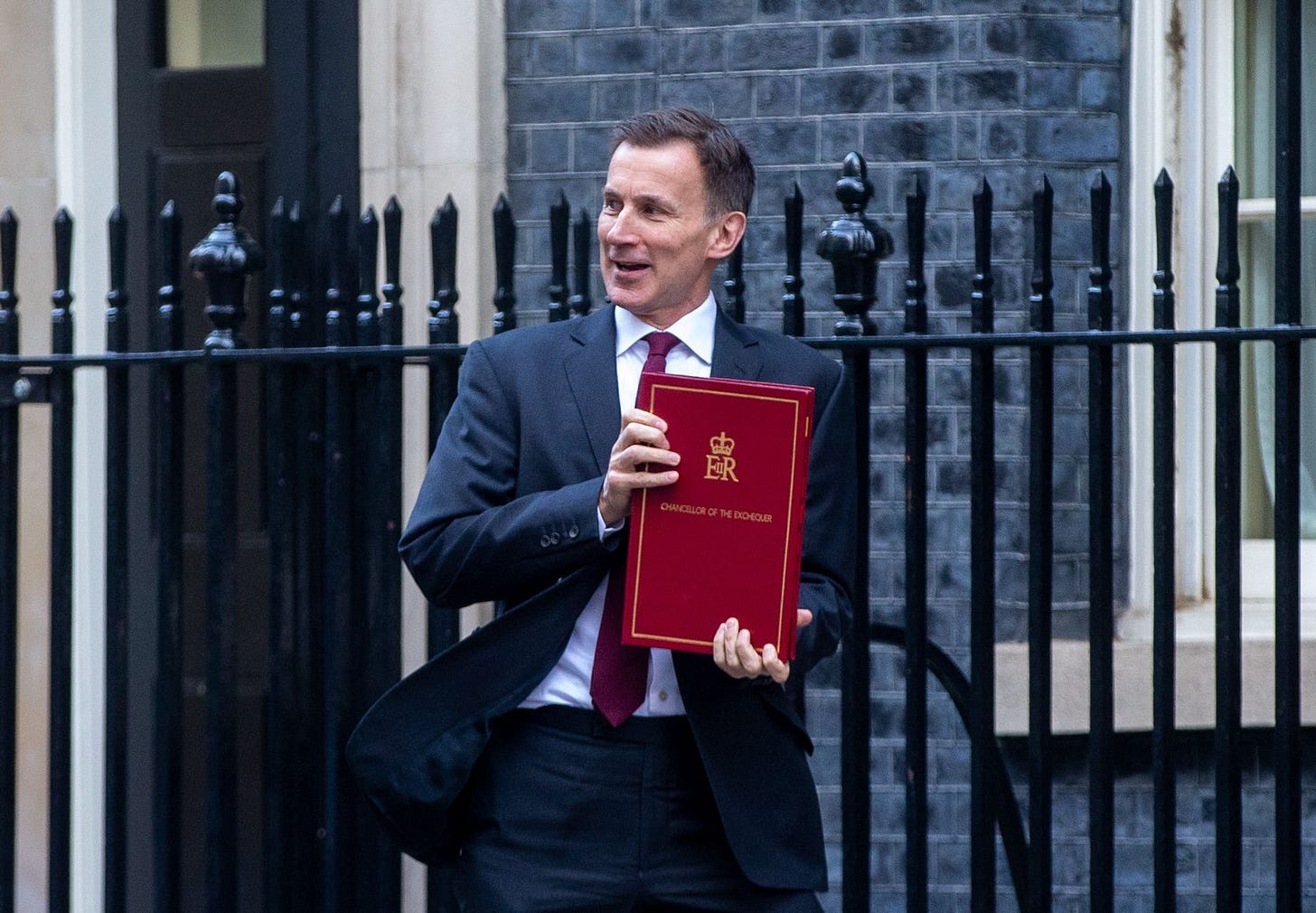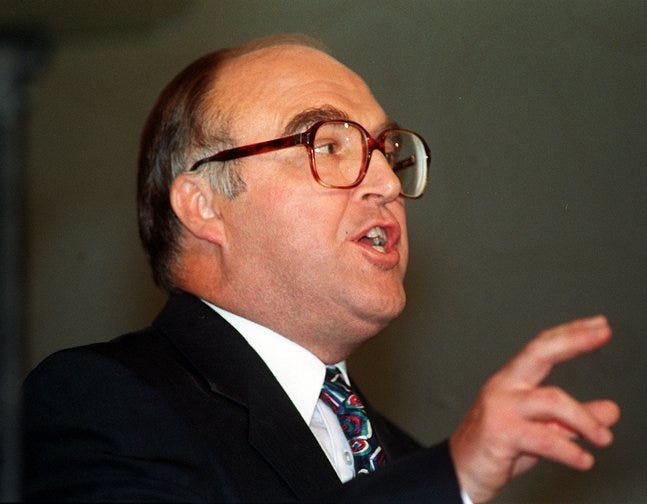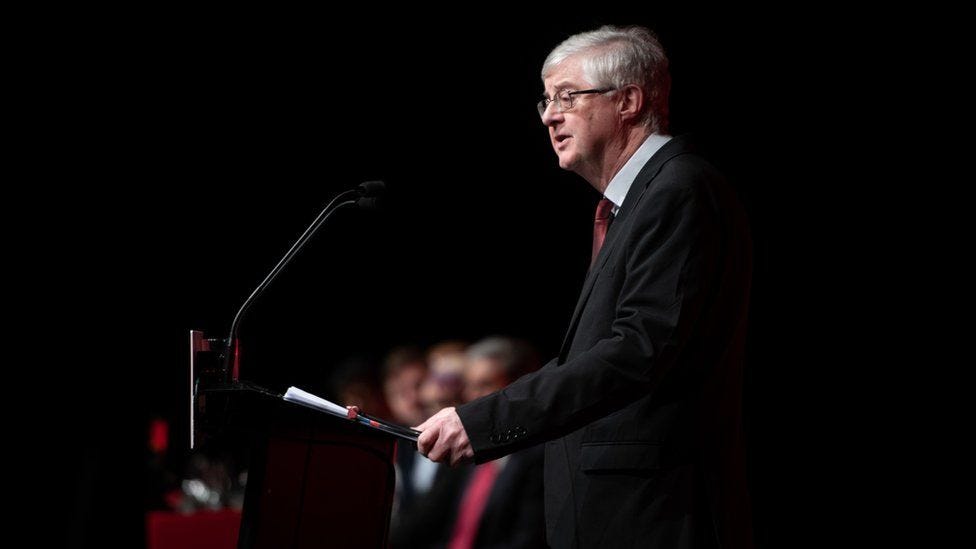First Draft #24: a newsletter on public language
Jeremy Hunt; "empower"; Budget rebuttals; Kairos; "robust"
Jeremy Hunt: prosaic on purpose
It would be doing Jeremy Hunt a disservice to say that his Budget speech was deliberately boring. (It would be doing him an even greater disservice to say it was accidentally boring). Better to say that it was consciously tranquil, reliably calm. After the fiasco of the last budget, in which Kwasi Kwarteng drove a truck full of ideological explosives at the economy, the speech of Chancellor Hunt was designed, at least in part, to reassure, to do enough by not doing too much. It was prosaic, on purpose.
Mario Cuomo’s over-quoted dictum about governing in prose comes to mind. Mr Hunt has decided to gamble on the idea that the British people might want a period of prosaic government after a few years of chaos. His speech was notably short on rhetorical ornament and that was the rhetorical effect. “I am no orator as Brutus is”, as Antony says in Julius Caesar. This is rhetoric effacing itself, as every prosaic speaker tries to do. The speech was accordingly tight and dense. Figures conveying recovery and stability, measures for national growth and equitable distribution, a stress on work and a surprise move on childcare. All done with no bid for the anthologies.
The contrast with preceding Chancellors was implicit but clear. All the intriguing rhetoric was unspoken: I will not be caught with my hand in the till, I will not spook the markets. And then, in the now-traditional late reveal, the Chancellor showed that the great prerogative of government is not just speech but speech that leads to action. “By my words I make it so”, he could have said, as he moved such a long way on child care that you could almost hear Keir Starmer thinking, “Oh no, we wanted to solve that problem”. @PhilipJCollins1
Jargon buster: Empower
There was a lot of empowerment flying around this International Women’s Day. The European Commission announced it wants to “empower women to pursue their life goals unhindered”. Sarah Ferguson, meanwhile, told Hello! Magazine that what makes her feel most “empowered as a woman” is “never giving up” (her recently published new novel, she adds, is a great illustration of this). And the government unveiled its new International Women and Girls Strategy: a “rallying cry”, as renowned feminist Andrew Mitchell writes in his foreword, “for women’s freedom, empowerment and prosperity.”
In an unequal world, wanting to empower women seems laudable enough. But there are problems with it. First, it elides the many forms that gender inequality takes, implying a single, simple solution. The European Commission, for instance, moves seamlessly from reports of Russian sexual violence in Ukraine to the problem of gender imbalances on corporate boards. Empowering women is a vague panacea for such distinct gendered harms, and one that obscures more complicated solutions.
Second, as the Duchess of York’s interview about female empowerment reveals, the platitude of empowering women assumes that any woman gaining any form of power is by definition a moral good. Sarah Ferguson is a member of the Royal family: a born aristocrat with an enormous fortune. In every way that matters, she is vastly more powerful than the vast majority of men on Earth. I have no doubt she has been mistreated during her life on the basis of her sex. But one thing she does not suffer from is a lack of power.
And this is the ultimate problem with the verb empower in the context of gender equality: power is so abstract that it ends up meaning nothing, which makes it a brilliant tool for obfuscation. So the Development Secretary can promise to “empower women and girls” in developing nations while the Prime Minister cuts a further £1.7 billion from the foreign aid budget he slashed as chancellor. Empowerment, conveniently, costs nothing. @HibbertLizzie
The only thing more difficult than delivering a Budget? Responding to one
In 1993, chancellor Norman Lamont broke an election promise on Budget day by introducing heavy taxes. Unbelievably, Labour leader John Smith responded by congratulating Lamont on his presentation and requesting bipartisan cooperation. These days, we skip past the pleasantries into critique. But the budget battle is never won on the day. It is the following days and weeks, after the think tanks and interest groups have given their verdicts, when the opposition has the best chance of landing a blow.
When Osborne made hot snacks more expensive in 2012, Ed Balls, Ed Miliband and Rachel Reeves took ITN to Morrisons and Greggs the following week. Labour dubbed Osborne’s £3 billion tax raid on pensioners the ‘granny tax’. And the Mail carried a cartoon of Osborne’s own machine gun-toting granny trundling towards No. 11. If you hear the opposition making wacky references to Alice in Wonderland or painting visual pictures of ‘champagne-sipping bankers’, I’m convinced it’s partly for the cartoons.
The pasty tax reveals an important truth about budgets and how to respond to them. For even the most calamitous budgets, failure isn’t instant. It took two months, Miliband crying ‘omnishambles’ at PMQs, Greggs threatening store closures, and a petition of over half a million signatures for Osborne to scrap his VAT hike. Marginal leads on Labour’s handling of the economy followed.
Each budget is a tapestry of possible missteps and unintended consequences. Coin some pithy lines and fan the flames of criticism from the IFS and OBR, and the opposition stands a good chance of unravelling the whole thing. It might just take a little patience. @james_carroll
Kairos: the rhetorical power of right now
The speech of the week was undoubtedly Mark Drakeford’s address to the Welsh Labour conference in Llandudno on Saturday. After the sudden loss of his wife Clare, in January, the First Minister spoke about his resolve to stay in politics: “in our brief lives,” he said, “we owe a duty of care not just to ourselves, not even just to our family and friends, but also to strangers – to those people who we will never know, and we will never meet, but whose welfare we understand is intimately bound up with our own.”
The speech had much to recommend it. It was short (by political standards), well-structured, and full of stories. But there was one rhetorical appeal that deserves particular attention: an ancient Greek technique known as kairos, or timeliness.
There is an art to making a moment feel significant. In truth, most announcements don’t have any particular urgency. They are dates in the diary for which a speaker feels they must find something to say. But Drakeford knew his audience. His central refrain, “hurry up please, it’s time”, which he borrowed from T.S. Eliot’s The Wasteland, tapped into the crowd’s hunger for an election and tethered his lofty vision to the here and now. The ovation was deafening. The lesson for campaigners? Make your moment feel momentous. Timeliness never goes out of style. @_alice_elliott
Jargon buster: Robust
From Wednesday’s Budget: a “robust analytical assessment” will determine the UK’s new investment zones. The range of things described by politicians as “robust” grows daily. Sajid Javid hailed the “robust success” of our vaccination programme. As chancellor, Rishi Sunak lauded the “robust regulatory framework” keeping our financial system in check. Keir Starmer is fond of urging a “robust debate” on the future of the country. With all these, “robust” is employed to make the ordinary appear less so. It adds no meaning and can be left out. But “robust” doesn’t just exaggerate; it also obscures and evades. “Our approach to national security is robust,” declared Boris Johnson to the House of Commons in 2021. Meaning what, exactly? “Robust” lends a veneer of vigour and strength to an absence of serious thought. Politicians parroting it are due a robust word. @AlexDymoke
Language and beyond
Early editions of this newsletter rhapsodised about Jonathan Nunn whose comprehensive chronicling of obscure London restaurants upended UK food writing. This week the New Yorker ran its own profile.
This brilliant essay on the Banshees of Inisherin changed my view of Martin McDonagh, and the “put-on” Irishness beloved by Hollywood.
Lawrence Friedman introduces the new language of war in the New Statesman.
It's So Sad When Old People Romanticize Their Heydays, Also the 90s Were Objectively the Best Time to Be Alive. A playful and convincing piece from writer Freddie deBoer.
Noah Smith’s lovely interview with environmentalist, writer and founding editor of Wired, Kevin Kelly. Kelly’s latest book is a compendium of life advice, so Smith begins by asking for some tips on writing. The response is brilliant: “Most articles and stories are improved significantly if you delete the first page of the manuscript draft. Immediately start with the action. Separate the processes of creating from improving. You can’t write and edit, or sculpt and polish, or make and analyse at the same time. If you do, the editor stops the creator. While you write the first draft, don’t let the judgy editor get near. At the start, the creator mind must be unleashed from judgement… To write about something hard to explain, write a detailed letter to a friend about why it is so hard to explain, and then remove the initial “Dear Friend” part and you’ll have a great first draft. To be interesting, just tell your story with uncommon honesty.”
An interesting essay on the concept of taste.
In light of the Silicon Valley Bank collapse: “How not to cover in a bank run” - The Atlantic on the perils of reporting on financial failure.
Former Obama advisor Daniel Pfeiffer on how communicators should use Musk-era Twitter. “Twitter is a decent platform for speaking. It is a terrible platform for listening. For politicians who want mass appeal, share your ideas on Twitter; don’t form your ideas on Twitter.”
New from us
Phil on the perils of chasing headlines about migrants.
Follow us
Last thing…
At The Draft we’re specialists in writing and rhetoric. We help businesses and public figures make their case more persuasively. If you could use our help, get in touch. And if you enjoy First Draft, forward it on. Thanks for reading.





Alice, great and fascinating piece, but it’s “The Waste Land”. Don’t hate me for being a pedant